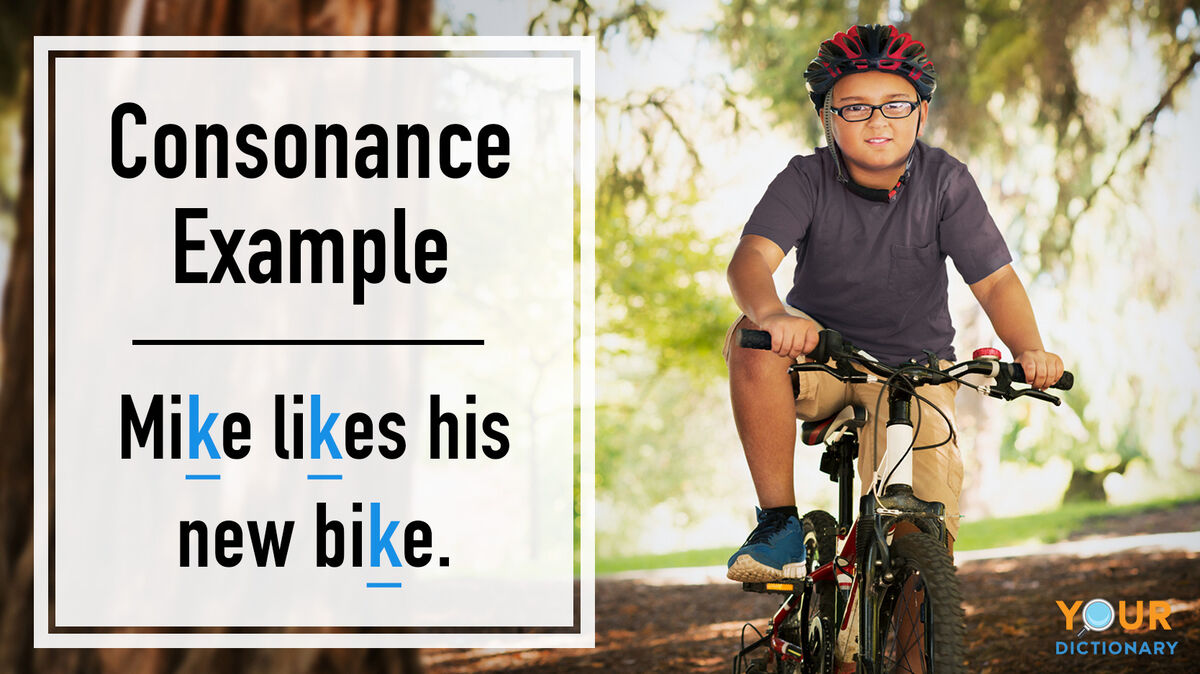
Consonance is defined as a pleasing sound caused by the repetition of similar consonant sounds within groups of words or a literary work. This repetition often occurs at the end of words, but may also be found within words. When consonant sounds are repeated only at the beginning of words, that is called alliteration rather than consonance. Discover several consonance examples in sentences, phrases and poems.
Examples of Consonance in Sentences
The sentences below illustrate how consonance can be used as a literary device within complete sentences.
- Mike likes his new bike.
- I will crawl away with the ball.
- He stood on the road and cried.
- Toss the glass, boss.
- It will creep and beep while you sleep.
- He struck a streak of bad luck.
- When Billie looked at the trailer, she smiled and laughed.
- I dropped the locket in the thick mud and it got stuck.
- The black sack is in the back.
- The zoo was amazing, especially the lizards and chimpanzees.
- The lawn thrived when it began to rain.
- I wish you would mash potatoes in this dish.
- Mammals named Sam are clammy.
- There is no right time to imitate the teacher.
- He thrusts his fists against the posts and still insists he sees the ghosts.
- Norm the worm took the garden by a storm this morn.
Word Pair Consonance Examples
Consonance examples aren't found only in complete sentences. You can also find them in phrases, such as the word pairs listed below.
- Blank and think
- Spelled and scald
- Sent and went
- Dawn goes down
- Laughed and coughed
- daft and deft
- Cheer and beer
- Strong and swing
- Far and jar
- Hard and ward
- Borrow and sorrow
- Litter and batter
- Slither and slather
- Pitter-patter
Examples of Consonance in Poems
Consonance is a popular literary device used by poets. Consider these examples in well-known popular poems.
The Acrobats by Shel Silverstein
The "ng" sound and the "z" sound are repeated in Shel Silverstein's "The Acrobats."
"I'll swing by my ankles.
She'll cling to your knees.
As you hang by your nose,
From a high-up trapeze.
But just one thing, please,
As we float through the breeze,
Don't sneeze."
'Twas Later When the Summer Went by Emily Dickinson
In Emily Dickinson's "'Twas Later When the Summer Went," the "w" sound is the most prevalent example of consonance. There are a few other repeated consonant sounds, including "m" and "p."
"'Twas later when the summer went
Than when the cricket came,
And yet we knew that gentle clock
Meant nought but going home.
'Twas sooner when the cricket went
Than when the winter came,
Yet that pathetic pendulum
Keeps esoteric time."
Stopping by Woods on a Snowy Evening by Robert Frost
In "Stopping by Woods on a Snowy Evening" by Robert Frost, the "s" sound is the best example of consonance. The poem also repeats the "p" sound a few times.
"He gives his harness bells a shake
To ask if there is some mistake.
The only other sound's the sweep
Of easy wind and downy flake."
Invitation by Shel Silverstein
The repetition of the "r" sound in the poem "Invitation" by Shel Silverstein is an excellent example of consonance in poetry.
"If you are a dreamer, come in,
If you are a dreamer, a wisher, a liar,
A hope-er, a pray-er, a magic bean buyer...
If you're a pretender, come sit by my fire
For we have some flax-golden tales to spin. Come in! Come in!"
Arms and the Boy by Wilfred Owen
In "Arms and the Boy" by Wilfred Owen, you can see line-by-line consonance. The "b" sound is repeated in the first line, "n" in the second line, "m" in the third line, and "f" in the fourth.
"Let the boy try along this bayonet blade
How cold steel is, and keen with hunger of blood;
Blue with all malice, like a madman's flash;
And thinly drawn with famishing for flesh."
Shall I Wasting in Despair by George Wither
Consonance abounds in "Shall I Wasting in Despair" by George Wither. The "l" sound appears at least once in all but the last two lines. The repetition of the "sh" sound at the beginning of several words in this poem illustrates alliteration.
"Great, or good, or kind, or fair, I will ne'er the more despair;
If she love me, this believe,
I will die ere she shall grieve;
If she slight me when I woo,
I can scorn and let her go;
For if she be not for me,
What care I for whom she be?"
From Consonance to Assonance
These different consonance examples in sentences, phrases and poems all show how consonance gives a pleasing sound and creates a special mood in everyday writing as well as in literature. The benefits of such repetition are not limited to consonant sounds. Review these examples of assonance to get an idea of how repeated vowel sounds can be used as a literary device. Then, explore an overall comparison of consonance, assonance and alliteration.